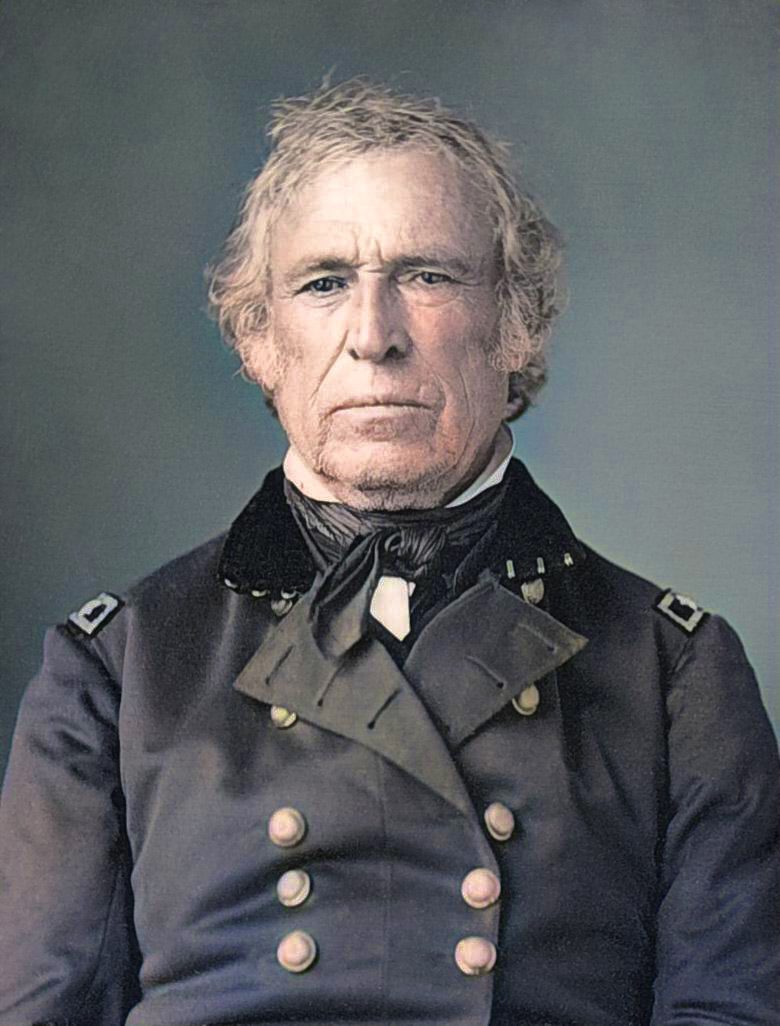By Mona Hatfield

FROM WIKIPEDIA COMMONS
Zachary Taylor (November 24, 1784 – July 9, 1850) was an American military leader who served as the 12th president of the United States from 1849 until his death in 1850. Taylor was a career officer in the United States Army, rising to the rank of major general and becoming a national hero for his victories in the Mexican–American War. As a result, he won election to the White House despite his vague political beliefs. His top priority as president was to preserve the Union. He died 16 months into his term from a stomach disease.
Taylor was born into a prominent family of plantation owners who moved westward from Virginia to Louisville, Kentucky, in his youth; he was the last president born before the adoption of the Constitution. He was commissioned as an officer in the U.S. Army in 1808 and made a name for himself as a captain in the War of 1812. He climbed the ranks of the military, establishing military forts along the Mississippi River and entering the Black Hawk War as a colonel in 1832. His success in the Second Seminole War attracted national attention and earned him the nickname “Old Rough and Ready”.
In 1845, during the annexation of Texas, President James K. Polk dispatched Taylor to the Rio Grande in anticipation of a battle with Mexico over the disputed Texas–Mexico border. The Mexican–American War broke out in April 1846, and Taylor defeated Mexican troops commanded by General Mariano Arista at the battles of Palo Alto and Resaca de la Palma, driving Arista’s troops out of Texas. Taylor then led his troops into Mexico, where they defeated Mexican troops commanded by Pedro de Ampudia at the Battle of Monterrey. Defying orders, Taylor led his troops further south and, despite being severely outnumbered, dealt a crushing blow to Mexican forces under General Antonio López de Santa Anna at the Battle of Buena Vista. Taylor’s troops were transferred to the command of Major General Winfield Scott, but Taylor retained his popularity.
The Whig Party convinced a reluctant Taylor to lead its ticket in the 1848 presidential election, despite his unclear political tenets and lack of interest in politics. At the 1848 Whig National Convention, Taylor defeated Winfield Scott and former senator Henry Clay for the party’s nomination. He won the general election alongside New York politician Millard Fillmore, defeating Democratic Party nominees Lewis Cass and William Orlando Butler, as well as a third-party effort led by former president Martin Van Buren and Charles Francis Adams Sr. of the Free Soil Party. Taylor became the first president to be elected without having previously held political office. As president, he kept his distance from Congress and his Cabinet, even though partisan tensions threatened to divide the Union. Debate over the status of slavery in the Mexican Cession dominated the national political agenda and led to threats of secession from Southerners. Despite being a Southerner and a slaveholder himself, Taylor did not push for the expansion of slavery, and sought sectional harmony above all other concerns. To avoid the issue of slavery, he urged settlers in New Mexico and California to bypass the territorial stage and draft constitutions for statehood, setting the stage for the Compromise of 1850.
Taylor died suddenly of a stomach disease on July 9, 1850, with his administration having accomplished little aside from the ratification of the Clayton–Bulwer Treaty and having made no progress on the most divisive issue in Congress and the nation: slavery. Vice President Fillmore assumed the presidency and served the remainder of his term. Historians and scholars have ranked Taylor in the bottom quartile of U.S. presidents, owing in part to his short term of office (16 months), though he has been described as “more a forgettable president than a failed one”.
TODAY’S ALMANAC
Question of the Day
Advice of the Day
Home Hint of the Day
Word of the Day
Puzzle of the Day
Formed long ago, yet made today; And most employed when others sleep; What few would like to give away; And fewer still to keep. (What is being described?)
Bed
Born
- Francesco Borromini (architect) –
- Ole Roemer (astronomer) –
- Thomas Hunt Morgan (geneticist) –
- William Faulkner (author) –
- Robert Brackman (artist) –
- Marl Rothko (artist) –
- Shel Silverstein (author, humorist) –
- Barbara Walters (broadcast journalist ) –
- Juliet Prowse (actress) –
- Michael Douglas (actor) –
- Cheryl Tiegs (model) –
- Mark Hamill (actor) –
- Christopher Reeve (actor) –
- Heather Locklear (actress) –
- Will Smith (actor) –
- Catherine Zeta Jones (actress) –
- Matthew Hasselbeck (football player) –
Died
- Felix-Gabriel Marchand (Quebec premier) –
- Mary Astor (actress) –
- George Plimpton (writer) –
- Don Adams (actor) –
- Andy Williams (singer) –
Events
- Vasco Núñez de Balboa crossed Isthmus of Panama and sighted the Pacific Ocean–
- Publick Occurrences became the first newspaper in the United States”“–
- Zachary Taylor’s troops captured the Mexican city of Monterrey–
- Congress established Yosemite National Park in California–
- TAT-1 first transatlantic telephone cable to link North America and U.K.–
- Sandra Day O’Connor was sworn in as an Associate Justice of the Supreme Court of the United States, the first woman to hold the office–
- An earthquake with a magnitude of 7.5 hit northern Peru–
- A 20-foot wide, 3,699-pound pumpkin pie was baked and presented at the New Bremen, Ohio, annual Pumpkinfest. It was certified as the world’s largest pumpkin pie.–
- A 3.4-magnitude earthquake shook New Hampshire about 10 miles north of the capital city of Concord–
Weather
- Cut Bank, Montana, recorded 4 degrees below zero F.–
- Early snow flurries, Fort Wayne, Indiana–
COURTESY www.alamanac.com
